COMMUNITY
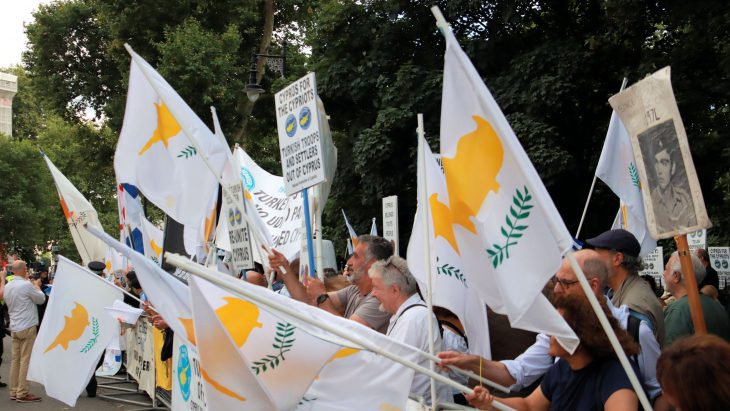
20th July 1974 marks one of the most tragic days in Cypriot history, at 5:30am the war sirens rang around the island once more.
The London Cypriot community will mark the tragic day with a protest at 43 Belgrave Square at 5pm in the evening. The event is organised by a Greek Cypriot and a Turkish Cypriot compatriot, both young Cypriots from London. One of the campaigners told London Greek Radio, his reasons for the local initiative.
“I am a Greek Cypriot [Marios Christofides] and Eren a Turkish Cypriot both members of various organisations and associations regarding Cyprus and the Cyprus problem, however we took it upon ourselves as two individuals as two Cypriots to organise the demo to try and show that irrelevant of ties to organisations we unite as one in the struggle for a free Cyprus, leaving political views, ethnicity, background and all of that behind us and focus on being one as Cypriots to fight for freedom.”
The Republic of Cyprus points to existing UN resolutions that the island reunifies under a federal umbrella with a central government in Nicosia.
In 1974, approximately 40,000 Turkish troops under the command of Lieutenant Nurettin Ersin implemented their invasion plan, code-named ‘Attila’, illegally invading the island in violation of the UN Security Council Charter.
Turkey still illegally occupies 37 per cent of Cyprus’ territory.
Turkish troops invaded Cyprus on July 20, 1974, five days after the legal government of the late Archbishop Makarios III was toppled by a military coup, engineered by the military junta then ruling Greece. Two unproductive conferences in Geneva followed: the first between Britain, Greece and Turkey and the second with the additional attendance of Greek Cypriot and Turkish Cypriot representatives. Three weeks after the ceasefire of July 22, and despite the fact that talks were still being held and just as an agreement seemed about to be reached, the Turkish army mounted a second full-scale offensive. As a result, Turkey increased its hold to include the booming tourist resort of Famagusta in the east and the rich citrus-growing area of Morphou in the west.
All in all, almost 37% of the territory of the Republic of Cyprus came under Turkish military occupation. Nearly one-third of the population, some 200,000 Greek Cypriots, were forcibly uprooted from their homes and properties, thousands were killed during the hostilities, over 1,000 persons were listed as missing while thousands of Greek Cypriots and Maronites remained enclaved.
Numerous UN resolutions have demanded respect to the independence, unity and territorial integrity of Cyprus, the return of the displaced to their homes, and the withdrawal of foreign troops from the island.
The last major round of peace talks collapsed in Crans-Montana, Switzerland, in July 2017.
July 2025, UN informal talks
Attempting to break the impasse, UN Secretary General Antonio Guterres began informal talks between Cypriot President Nicos Christodoulides and Turkish Cypriot leader Ersin Tatar.
Guterres on Thursday called the meetings at the UN in New York “constructive” and pointed to progress on four of the six initiatives that the leaders had agreed to in March.
“I think we are building, step-by-step, confidence and creating conditions to do concrete things to benefit the Cypriot people,” Guterres said in remarks to reporters.
“We are seeing small but significant progress, step by step, towards the major goal which is the resumption of talks and the resolution of the Cyprus problem,” Christodoulides said after the meeting.
The Cyprus problem is complicated and covers a range of critical issues including security, property, refugees, settlers, the economy and the constitution.
July 2025
Pic: National Federation of Cypriots in the UK, 20th July 2024
Article written by London Greek Radio

London’s Cypriot communities celebrate culture and creativity at the 40th Annual CyWineFest 2025.
London Greek Radio is pleased to announce that will be joining compatriots at this year’s Cypriot Wine Festival and Business Expo 2025 on Saturday 7th and Sunday 8th June 2025.
The event kicked off on Friday evening with a live performance from Antri Karantoni and Michalis Hadjimichael, for Paradosiaki Vradia. The event continues all day on Saturday and Sunday with evening performances from Christos Menidiatis and Marianna Papamakariou live at the North London venue.
The address is The Decorium, 22 Western Road, London N22 6UH; you can purchase your tickets directly for the evening concert seating area, by visiting lgr.co.uk.
The visitors who attend can enjoy unlimited wine tasting with some of Cyprus’ award-winning wines, they can also visit the CyWineFest stall holders, as well as souvlakia, traditional toasted sandwiches, kalamari, kleftiko, koubes, loukmades, ice cream and a whole range of sweet and savoury treats to try and buy.
LGR’s DJ Chris Theoharous will be on the decks along with your favourite LGR presenters, reunite with us and be part of this special anniversary.
British Cypriot artists with performances including our own Elizabeth Chapman, other acts Giorgos Theodorou and Theo Lucas is comprising the Cypriot singer’s line-up.
Other acts include the VIMA Greek Dance School and the Spasta Greek Dancers. Magician Peter Vassila will have spectators gob smacked with his act of close-up illusions. The Ashmole Greek School dancers are on Saturday only. The Greek School of Mansfield with children under Ms Margarita Efthymiou tutorage are on Sunday only. The dance troupe Angela Procopiou DWA, with award-winning young dancers performing street and Greek dance. Become part of the legacy and immerse yourself in traditional Cypriot culture with a modern twist.
The London Autism Group Charity is sharing the pitch with London Greek Radio and by working diligently together we are raising awareness over autism. The charity hosts a lively slot on-air All About Autism every first Thursday of the month.
The Leukaemia Cancer Society is spreading awareness over cancer related-issues, a society created directly from a fundraising appeal on London Greek Radio in 1994 that inspired local Cypriots to set-up this charity.
Visitors claim freebies merch with a chance at a quick selfie by visiting the LGR pitch. Swipe your phone with our QR Code, to get listening to the London Greek Radio free app on the go! The Official Greek Music Station on the FM Airwaves that can be heard now on Freeview TV 277, & Freely TV 566 for nationwide coverage across the UK.
📅: Saturday, June 7th & Sunday, June 8th, 2025
📍: The Decorium, Western Road, London, N22 6UH
🕖: 11:00 AM – 17:00 PM
🕖: 17:45 PM – 11:00 PM
Tickets & more info 👇
🎟: 👉 LGRRADIO.CWFEXPO.CO.UK
We are looking forward to seeing you there.
June 2025
Article written by London Greek Radio

This is an urgent appeal to save Natassa, with a Greek Cypriot background. Natassa has been diagnosed with acute lymphoblastic leukemia (ALL), a rare and fast-developing blood cancer. Her only hope is a stem cell transplant, we are desperately appealing to people aged 17 to 55 from the Cypriot community and beyond to become a donor.
London Greek Radio is backing the Official Campaign and is playing a robust part in the Cause.
An event was held at the Southgate Hockey Club organised by Leukemia Cancer Society who were holding a donor registration drive with blood cancer charity DKMS in conjunction with Omonia Youth.
This Recruitment Clinic, Leukaemia Cancer Society and DKMS is urging Cypriots 17 to 55-year-olds to register as lifesaving stem cell donors.
They were helping Natassa find her life saving match.
19-year-old Natassa has leukaemia a form of blood cancer and urgently needs a stem cell transplant.
Natassa is of Cypriot heritage which makes it harder for her to find a matching donor.
They were asking you, especially if you share her heritage to register as a potential stem cell donor.
“Thank You for Your Support! We are overwhelmed with gratitude for everyone who braved the terrible weather and attended our recent stem cell donor recruitment drive to find a donor for Natassa and others waiting for that lifesaving match. Your presence and willingness to make a difference have brought us one step closer to saving lives. Each registration represents hope for those in need of a lifesaving stem cell transplant. Together, we are stronger, and together, we are making a difference.”
Also, a big thank you to Omonia Youth FC for their support. Thank you for standing with us in this vital cause.
Let’s keep the momentum going! 💙”.
Blood stem cell transplants are used to treat blood cancers, and we simply don’t have enough Cypriots on the registry.
“We do wish more people would come forward; we do need a lot more Cypriot people. We are greatly under-represented on the register. The Cypriot community is only a very small percentage of the British registry, a very small percentage. So, we need to do whatever we can to increase that and to make the register more diverse,” said Androulla Stylianou, explaining that Cypriots are heavily underrepresented on the register. She is the Co-Ordinator, at The Leukaemia Cancer Society in Myddleton Road.
“We are a very generous community, we are a giving people, a loving people; I think it’s just that people are unaware how simple a procedure it is. And maybe that deters them from coming forward. It is a very, very simple procedure that takes not too long at all of your time and a procedure that can potentially save a life,” said Androulla.
Diversifying the register is extremely important to people from our community.
Currently, only 2% of the UK population are registered as potential stem cell donors, and just 13% of those on the register come from minority ethnic backgrounds.
This means patients from those communities have a low chance of finding a matching blood stem cell donor.
They are also twice as likely to not find a donor than the white population.
Their appeal is supported by British blood charity DKMS, which can arrange a mass swab testing session for groups, or they can send a special kit home for people to do their own swab test.
Currently, the odds of finding a match for Cypriots, is very low due to the small number of people from the community being registered on the global blood register.
To help improve the odds of survival for blood cancer patients of Cypriot heritage, simply register online at dkms.org.uk for a cheek swab kit. It’s open to all UK residents who are healthy and aged between 17- 55 years of age.
The swab test itself is a painless, 30-second procedure. You use a cotton bud to rub on the inside of your cheek, which is returned to DKMS in a sealed bag. Its labs will do the necessary tests and add your details to the UK blood register, which is accessible to other blood charities worldwide. You only need to do the test once and it will cover you until you reach 55.
Where a match is generated, the process for donating stem cells is far easier and less invasive than previously, and there are no known health risks. You simply give blood, which is used for stem cell treatment of the patient with blood cancer.
There is nothing to fear, it is just a cheek swab, so nothing too intrusive.
The Leukaemia Cancer Society was founded in 1994 and in response to a radio appeal for John Triteos on London Greek Radio..
“It was an appeal for John Triteous that we heard, and we went forward to give blood and join the register ourselves. And that is what inspired, the Leukaemia Cancer Society to recruit Mediterranean donors, Greek-Cypriot, Turkish-Cypriot, to help save lives.
“It was a radio appeal which inspired the creation of The Leukaemia Cancer Society, and LGR actually,” said Androulla.
Please step forward, there aren’t many Cypriots on the register and for that reason Natassa and others haven’t found a match so far.
It’s easy to register as a donor, by going to The Leukaemia Cancer Society’s website, you can register to become a donor. After registering, a swab will be sent to you, where you swab inside your mouth and send it back to the charity.
If you’re a match, you’ll receive a call on how to give your stem cell or bone marrow – and it could save someone’s life.
For more information on how to become a donor, click here.
Or for more information on the charity, click here.
Alternatively, you can contact Androulla from Leukaemia Cancer Society on 07872 633508 or 020 8374 4821 for more details.
Pic: The Leukaemia Cancer Society Facebook
Article written by London Greek Radio
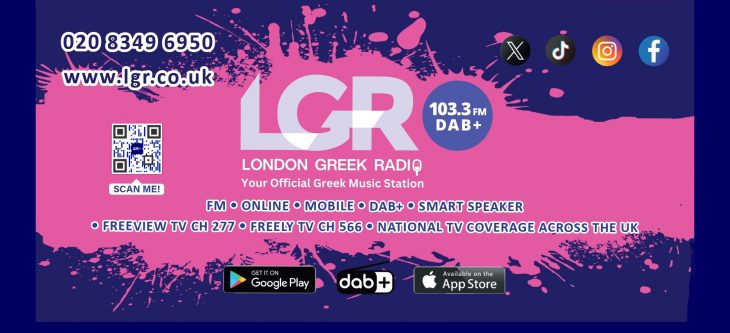
The first and only 24-hour commercial Greek radio station to hold a FM license in London is celebrating 35 years of success this month. It is a clear example of how Greek music and its broadcasting platform have flourished in Great Britain to cater for its demographic.
LGR 103.3 FM first went on-air on 13th November 1989 from its LGR Studios at Haringey, Vale Road.
London Greek Radio exists to enlighten, amuse and improve the lives of our community both in the UK and abroad. In preserving our Greek and Cypriot heritage and bringing together London’s vibrant Greek community, the LGR brand is thriving by celebrating its Greek and Cypriot identity and roots.
The pirate LGR went on-air on 8th October 1983, with its iconic founders Akis Eracleous and Chris Harmanda. The intuitive Mr Harmanda entered broadcasting to give the London Cypriot community a voice, which he and Mr Eracleous indisputably achieved.
In 2018, we tragically lost both Akis and Chris, but they left with us their incredible legacies. The perseverance and bravery of these men, who scaled the rooftops of sites to ensure that each morning we all awoke to the sound of LGR, can never be forgotten.
The staff and volunteers endured great adversity and went to great lengths during the 1980’s to keep London Greek Radio on the air.
LGR is a station with its timeless traits and nostalgia, a strong connection between “family and community”. You often hear, “I grew up listening to LGR as a child with parents, family!”, it’s that unique space it occupies. This is where LGR plays to its strengths and is the reason why London-born Greeks/Cypriots come back to it. This is the modern legacy of London Greek Radio.
LGR presenter Tony Neophytou mentions that “the Greek speaking community have a penchant for radio because of the strength of their attachment to back home. Whether they come from Cyprus, Greece or the Diaspora, anything that recreates a sense of their roots stirs them emotionally.”
The mid-80’s protest at the Camden Electric Ballroom, fundraisers, a most notably 50,000 signature-petition, press campaigns, a lobby of Parliament, with fervent community support: the radio authorities were convinced that LGR should be granted a license.
The pirate LGR left the air at the end of 1988 having decided to apply for one of the new incremental radio licenses. They decided to work together with Afro-Carribean station WNK to share a frequency, winning the North London license with a 12-hour daily allowance. LGR returned to the air legally as London’s first Greek community radio station in November 1989. Unluckily for WNK, went into liquidation around 1993, which officially left LGR reigning 24/7 to this day!
The book, ‘London’s Pirate Pioneers’ (2015) by Stephen Hebditch tells the story of the capital’s pirate radio stations and the people who helped change the British broadcasting system. He writes about LGR’s undeniable legacy in the eighties and the intense pressures it faced to shut down.
On November 13th, 1989, LGR opened its doors as a fully legal station, with offices and a studio located on Vale Road, Haringey. In 2003, LGR purchased a freehold in Finchley and moved to its current studios at LGR House.
The station is an integrated part of the communities’ social lives, including the organised Greekology events. The launching of LGR Club Nights, which helped to boost the credibility and impact of the station. In 2012, its debut at the Marquee Club with Cypriot Eurovision star Ivi Adamou sold-out very quickly. LGR club fixtures are currently the station’s biggest event, with a few dates in London taking place each year.
How to keep LGR relevant for young people in a multi-platform world is a rhetorical question. LGR’s constantly evolving with the modern context, Digital, Freeview TV, recourse to TikTok, Instagam etc.
LGR has recently increased its English language airtime encouraging more Greek-speaking young people to listen every day. The likeable personalities, energetic, lively or softly-spoken voices, there’s a little something for every palate.
The Cypriot migrants settled from the 1950s, 60s, and 70s, were pinned to the rag trade and tuned into pirate LGR every day. The demographics have changed a lot since, so too the dynamics, with the addition in number of Greek Diaspora, London’s lively Hellene community.
‘We’ value our collective identity in a multi-cultural London, our compatriots have integrated into UK culture and desire their heritage, so for LGR to provide access to these roots is of paramount importance.
LGR, with a deeply felt community DNA, celebrity artists and Greek singers have frequented the FM station over the years.
LGR has supported charities including Nepomak.uk Connecting Young Cypriots, Radiomarathon, Alkionides UK Charity, London Autism Group Charity, UK Thalassaemia Society UKTS with enlightening radio shows about autism and thalassaemia.
The Leukaemia Cancer Society credits LGR for creating the cancer charity in the mid-90s, too. The LCS website writing about it said:
“In 1994 London Greek Radio (LGR) put out a mother’s appeal for her son. Flushed with success the group decided to carry on recruiting new donors, raising awareness of blood cancers, and supporting patients with the disease. Within a year of hearing the appeal on London Greek Radio, the group had formed a committee and registered the charity.”
LGR is a commercial station and survives on the income generated from its loyal and valued customers and whilst this is the case, it offers a free service to local charity and community interests. It also serves advertising for many Greek and Cypriot run businesses in and around North London.
The LGR brand is alive and thriving to this very day. Today, in addition to 103.3 FM as always, LGR can now be heard on DAB+ in London and Birmingham. The station was launched recently on Freeview Channel 277, freely TV also, acquiring a nationwide coverage.
Furthermore, listeners extend worldwide at lgr.co.uk and the station has a free app for mobile devices which listeners can download from the App or Play stores embracing the ‘on-the-move’ audience.
The LGR brand is trusted for working with key players in the arts and creative industries. LGR is at the “heart” of the social pulse, co-ordinating as an official media sponsor. Including the Cy Wine Fest and celebrity and star-studied concerts, community events etc.
Today, LGR is thriving by celebrating Greek/Cypriot identity and culture and heritage. Its music news, Chart-toppers, culture-relevant tit-bits designed to appeal to the young demographic. Hearing news about Greece defeating England, to Helena Paparizou’s Eurovision triumph, Eleni Foureira’s 2nd-placer or Euro 2004, makes the first place you want to go be LGR. To hear what we are saying about how we are feeling there about milestone moments with a culture relevance to LGR.
LGR is playing a key role as a source of new talent, as a link between mainstream and our culture and as a vital platform for Greek and Cypriot culture.
There is no better way to mark ’35’ incredible years of LGR and its help in championing identity, than with celebrating with our listeners, showcasing Greek and Cypriot music and culture. We were the Official Radio Sponsors to Cy Wine Fest in October casting a talent spotlight on artists, also, our Greekology showcases homegrown heritage to the wider public.
The audience base of LGR, which includes listeners from the Italian, Spanish, Arab, Jewish, Armenian, Bulgarian, and Turkish Cypriot communities, is well-established and diverse.
LGR’s Managing Director, Tony Jay, said, “More listeners are discovering the ever-growing London Greek Radio family every day, not only Greek-speaking listeners but English, Jewish, Albanian, Arab, Bulgarian, Turkish, Russian and many more that frequently tune in.
He added, “LGR is undergoing a revamp with fresh ideas to attract an even wider audience. Exciting times ahead ‘onwards and upwards’.”
With LGR’s edgier playlists of the biggest Greek and Cypriot tunes, Modern Laika, Greek Pop, Entechna, Golden-Oldies, Alternative, Folk and Current Chart Hits, we continue to serve the listener. It’s this enigmatic reason that the station remains the preferred choice in most Greek and Cypriot homes, offices, shops, factories, workplaces, vehicles and venues.
Our multilingual programmes–English and Greek–reach a large and diverse audience on a global scale. It broadcasts music, interviews, announcements, community events, local news, Greek and Cypriot news in addition to church services. While catering to the lively lifestyle of one of London’s prosperous communities, the wide range of programmes are made to appeal to all age groups.
Article written by London Greek Radio

London Greek Radio is pleased to announce that will be joining thousands at this year’s Cypriot Wine Festival and Business Expo 2024 on Saturday 5th and Sunday 6th October. The venue is at The Decorium, 22 Western Road, London N22 6UH.
Billed as “CyWineFest 2024 – The Legacy Continues… Don’t miss the biggest Cypriot Festival outside of Cyprus!
“Become part of the legacy and immerse yourself in traditional Cypriot culture with a modern twist. This year, CyWineFest offers visitors of all ages the fantastic opportunity to experience and explore the vibrant, warm, and welcoming spirit of Cypriots in the UK through food, drink, culture, dance, and live music.”
CWF, in association with Showtime promotions, presents the grand opening of CyWineFest 2024 with Nikos Makropoulos at The Decorium. The bouzoukia night with the Greek music star is live in London for the first time on Friday 4th October.
The event also includes a fantastic entertainment programme of both traditional Cypriot dances and musicians, and in true CyWineFest style, they are “topping the bill” with Panos Kalidis who will be attending from Athens. The Greek singer is headlining and will be live in London exclusively at #CyWineFest 2024 alongside a special guest appearance from Eleftheria Eleftheriou.
The Two-Day extravaganza will be celebrating our Cypriot homegrown talents. Andre Junior, at just 19, has already made waves with his hit singles ‘Slide’ and ‘Only One’ and has been working hard in the studio, gearing up for his next big move. But that’s not all—he’s also stepped into the world of acting, making his debut in ‘Snapcatch’ and starring in the upcoming film ‘Just Two Drops’.
Bouzoukia Fever aka Mario Constantinou, his talented students and Dora Georgouli, Rap Artist Teknik, of Greek Cypriot heritage, Theo Lucas, Harry Georgiou, Eric Eracleous, Eleni Asterakia, Andreas Liberos, Eleftheria Georgiou, Christina Katsi from snow Princess parties, Elizabeth Chapman and Katerina Neocleous amongst the line-ups.
The thousands who attend can enjoy unlimited wine tasting with some of Cyprus’ award-winning wines, they can also visit the CyWineFest stall holders, as well as souvlakia, traditional toasted sandwiches, kalamari, kleftiko, koubes, loukmades, ice cream and a whole range of sweet and savoury treats to try and buy.
Master of Ceremonies DJ Chris Theoharous will be LIVE on the decks so don’t miss the music, the atmosphere and the party!!
Come and Say Hello! We are looking forward to seeing you there.
Ticket & Information:
VIP Concert Seated Tickets £25.00 + Booking Fee and include any time entry into the event!
Get your tickets NOW at http://www.cwfexpo.co.uk/
Main Sponsor Stef & Philips, Boulter & Co, Alpha Bank, C. Michael & Co, N.N Accountancy Services Ltd Southern Territory, Sewardstone Park and Argo Management.
Official Media Sponsor LGR 103.3 FM
Remember tickets must be pre-purchased to guarantee entry into the event.
October 2024
Article written by London Greek Radio
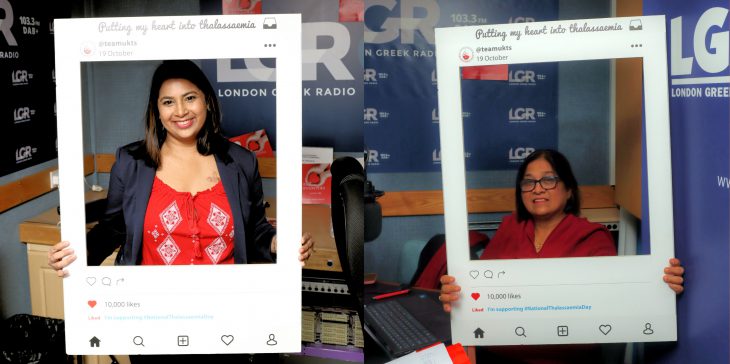
NHS rolls out world-first gene therapy for thalassaemia patients
Beta thalassaemia predominantly affects individuals of Cypriot, Greek, Italian, South Asian, Southeast Asian, and Middle Eastern descent.
Hundreds of patients in England with a life-limiting blood disorder are to benefit from a world-first gene-editing therapy. People with transfusion-dependent beta thalassaemia, or TDT, rely on regular lifelong blood transfusions to survive. But the new treatment offers them a life free from that and has been recommended for use on England’s NHS.
Roanna Maharaj was just a baby when she was diagnosed with thalassaemia, a life-limiting inherited condition that prevents the body carrying oxygen in red blood cells. For 35 years, she’s been having life-saving blood transfusions every few weeks. But the approval of new gene-editing therapy, CASgevy, for use by NHS England could change everything.
“Right now, the quality of life and the life expectancy in the UK for patients like myself are not that great compared to the general population, so you’re looking at 30s, 40s. And now to see the younger generation probably won’t have to go through the burden that I did and the battles I had and might have a normal life early on is the best news we could ever get in the world.”
Roanna is one of 460 people in England who could benefit from the treatment.
Stem cells are extracted from the patient’s bone marrow, the faulty gene is then modified using CRISPR-Cas9 technology in the lab, and the edited genres are infused back into the patient. The new gene-edited cells are then able to instruct the body to make hemoglobin, enabling the red blood cells to do their essential work, delivering oxygen around the body. The therapy usually costs £1.6 million pounds, but the NHS has negotiated a discount.
Romaine Maharaj, the executive director of the UK Thalassaemia Society, said: “With Nice’s approval of gene therapy for transfusion-dependent thalassaemia under the NHS managed access scheme, we stand on the brink of a revolutionary breakthrough.
“This transformative treatment offers patients a life-changing opportunity, enabling them to repair their own cells and embrace a future free from the challenges of their condition.
“It is a beacon of hope that underscores the power of innovation in medicine, paving the way for curative options that can truly enhance the quality of life for everyone affected.”
Amanda Pritchard, the chief executive of the NHS, said: “This is a historic moment for people living with beta thalassaemia, with a potential cure for those facing this debilitating disorder now available on the NHS. Ordinarily, patients experience painful side effects and undergo regular transfusions, which severely impact their quality of life, but this therapy offers people a life free from that, as well as the hope of living longer, which is truly amazing news.”
Tune into talking All Things Thalassaemia every third Thursday of the month, on LGR at 7pm. The talk show to raise awareness about thalassaemia, our wholly engaging format, with top tips and advice, for our listeners.
LGR 103.3 FM
DAB+ Digital in London & Birmingham
On-line at lgr.co.uk
Smart Speaker “Play London Greek Radio”
Article written by London Greek Radio
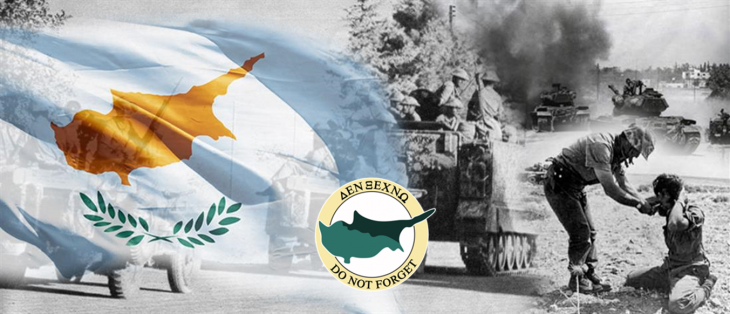
TODAY Cypriots from the London community will mark the tragic day with a pro-reunification rally at 43 Belgrave Square at 6.30pm in the evening. This event is organised by the National Federation of Cypriots in the UK who represent a number of associations within the wider Cypriot community in this country.
Nepomak UK a group connecting young Cypriots on a talk show on LGR this week told listeners, “There’s a sense of community and Cypriot unity within Cypriot Greeks, Turkish, Armenian ethnicities in London.” This sense of reality is the thing to “inspire Cypriots” to resolve the long-protracted Cyprus problem the team added.
The “Cypriot youth” could well serve as the catalyst that eventually arrives at a “solution” said Constantine Alexandrou, honorary Vice-President at Nepomak UK. The Republic of Cyprus points to existing U.N. resolutions that the island reunifies under a federal umbrella with a central government in Nicosia.
On July 20, 1974 at 5:30am, Turkish troops landed on the Republic of Cyprus’ coast five miles off Kyrenia. Since that day, nothing on the island has ever been the same.
Every year since, on the anniversary of the invasion, sirens have blared out over the Republic, recalling the moment Turkish troops invaded.
In 1974, approximately 40,000 Turkish troops under the command of Lieutenant Nurettin Ersin implemented their invasion plan, code-named ‘Attila’, illegally invading the island in violation of the UN Security Council Charter.
Turkey still illegally occupies 37 per cent of Cyprus’ territory.
Turkish troops invaded Cyprus on July 20, 1974, five days after the legal government of the late Archbishop Makarios III was toppled by a military coup, engineered by the military junta then ruling Greece. Two unproductive conferences in Geneva followed; the first between Britain, Greece and Turkey and the second with the additional attendance of Greek Cypriot and Turkish Cypriot representatives. Three weeks after the ceasefire of July 22, and despite the fact that talks were still being held and just as an agreement seemed about to be reached, the Turkish army mounted a second full-scale offensive. As a result, Turkey increased its hold to include the booming tourist resort of Famagusta in the east and the rich citrus-growing area of Morphou in the west.
All in all, almost 37% of the territory of the Republic of Cyprus came under Turkish military occupation. Nearly one-third of the population, some 200,000 Greek Cypriots, were forcibly uprooted from their homes and properties, thousands were killed during the hostilities, over 1,000 persons were listed as missing while thousands of Greek Cypriots and Maronites remained enclaved.
Numerous UN resolutions have demanded respect to the independence, unity and territorial integrity of Cyprus, the return of the displaced to their homes, and the withdrawal of foreign troops from the island, but all resolutions have been ignored by Turkey.
For five decades, Cyprus has been one of the most troublesome problems faced by the United Nations. There have been countless attempts to reunite this island. However, efforts have been at a dead end since the last round of United Nations sponsored talks failed in 2017.
Attempting to break the impasse, an envoy for U.N. Secretary General Antonio Guterres began exploring contacts on Cyprus earlier this year.
Maria Angela Holguin’s mandate to explore the recommencement of negotiations, saw her embark on intensive shuttle tours of Cyprus, Europe and the region to gauge opinion. Nevertheless, her efforts failed to gain momentum.
‘It’s important to steer away from solutions that have created unfulfilled expectations in the past and actually led to more disagreement and disappointments’, Holguin said in an open letter last week. She urged people to think differently, saying a common future would bring about great opportunities for all Cypriots.
In a long and often emotional letter, she urged Cypriots to ‘overcome the history of pain’.
The Cyprus problem is complicated and covers a range of critical issues including security, property, refugees, settlers, the economy and the constitution.
50 years on from the most tragic page in the Republic of Cyprus’ history, at 5:30am the war sirens rang around the island once more.
Article written by London Greek Radio

8-month-old baby British Cypriot Saylor needs your help.
This is an urgent appeal to save Saylor an 8-month-old baby girl, with a Greek Cypriot grandfather. Saylor has been diagnosed with a very rare type of leukaemia called JMMl affecting only 1 in a million children. Her only hope is a stem cell transplant, we are desperately appealing to people aged 17 to 55 from the Greek Cypriot community and beyond to become a donor.
All it takes is a cheek swab which is simple and painless. Please register on-line today and order your swab kit at dkms.org.uk, you could be the match to save Saylor.
Every 20 minutes, someone in the UK is diagnosed with blood cancer – those that affect the body’s bone marrow, blood or lymphatic system – such as leukaemia, myelome or lymphona. Yet, just 2% of the UK population is registered as potential blood stem cell donors. People from Cypriot, Greek and mixed ethnicity backgrounds are under-represented as donors.
Diversifying the register is extremely important to people from our community.
dkms.org.uk or scan the QR Code to register today.
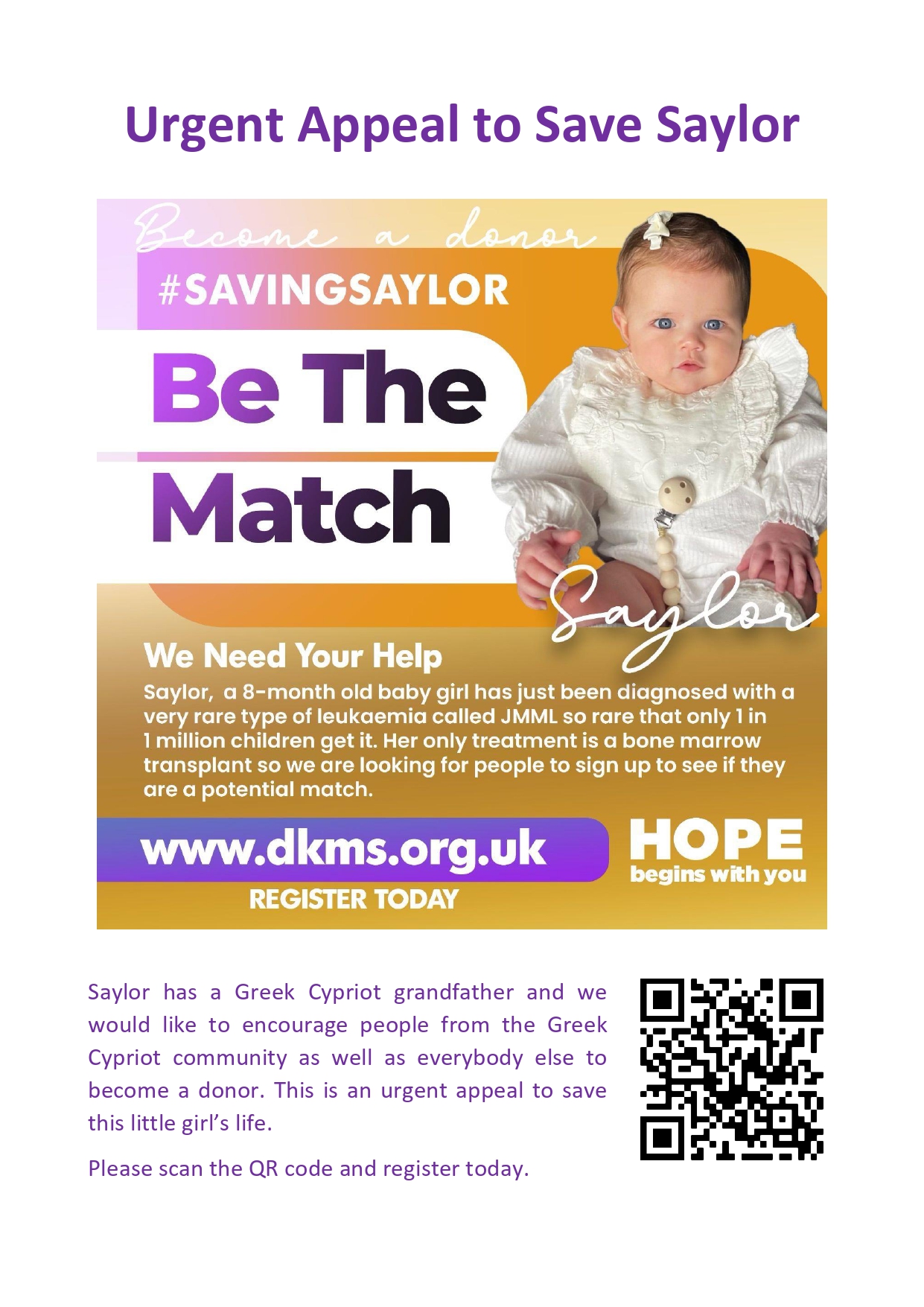
Article written by London Greek Radio
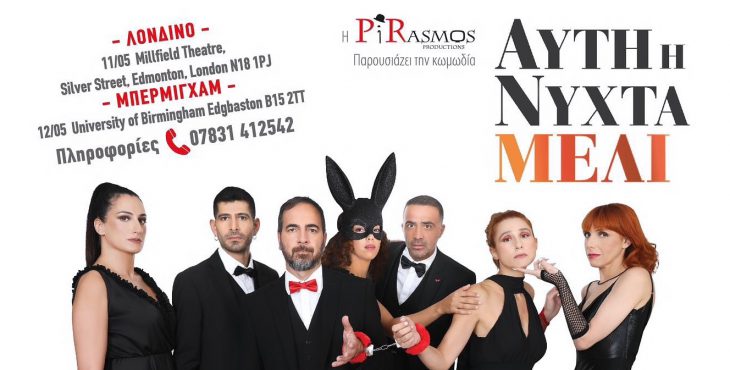
Cypriot play “This Night Honey” coming to the UK, part of the proceeds will be donated to the charity Alkionides UK.
The theatre group of the popular actor and director Lori Loizidis is travelling to London for the first time to present the successful theatrical comedy “This Night Honey” on Saturday 11th May 2024 at 7.30pm at Millfield Theatre, in Edmonton North London. Birmingham, Sunday 12th May at 7.30pm at University of Birmingham.
Entry: 16+ years-old
A couple decides to break the routine of their long-term relationship by taking an escape to a luxury resort in Pegeia, Paphos. The luxurious suite of the hotel and the incredible view against the background of the endless blue seem like the ideal setting for the rekindling of passion in their love life.
Will their venture have a successful outcome? Or will their love affair end ignominiously? An important role in the achievement of the goal will be played by the theatre audience as the spectators during the play will be invited to take part in a group “psychotherapy” giving advice to the couple and partly determining the outcome of the play.
The elements of the play compose a unique mosaic of incredible laughter, love, romance, and authentic love. Through the script, the viewer will have the opportunity to travel musically to nostalgic times. Back when everything was more innocent, more direct, and simpler.
Actors : Loris Loizidis, Michalis Sofokleous, Maria Mastridou, Maria Papakosta, Stella Filippidou, Irini Salata and Konstantinos Tsitsios star in the show.
11/05/2024 at 7pm, at Millfield Theatre, at Edmonton, North London to spend two hours of incredible laughter and at the same time travel back in time, to beautiful and nostalgic times.
12/05/2024 at 7.30pm, Birmingham, University of Birmingham Edgbaston B15 2TT.
It is worth noting that part of the proceeds will be allocated to support the charity Alkionides UK.
Text – direction Loris Loizidis
The show is suitable for people over 16 years old.
Tickets are priced at £35 & £30 pounds from Millfield Theatre. Start time of the show: 7:30pm
https://www.millfieldtheatre.co.uk/whats-on/this-night-honey/
For more information 07831 412 542
MEDIA SPONSORS: LGR & HELLENIC TV
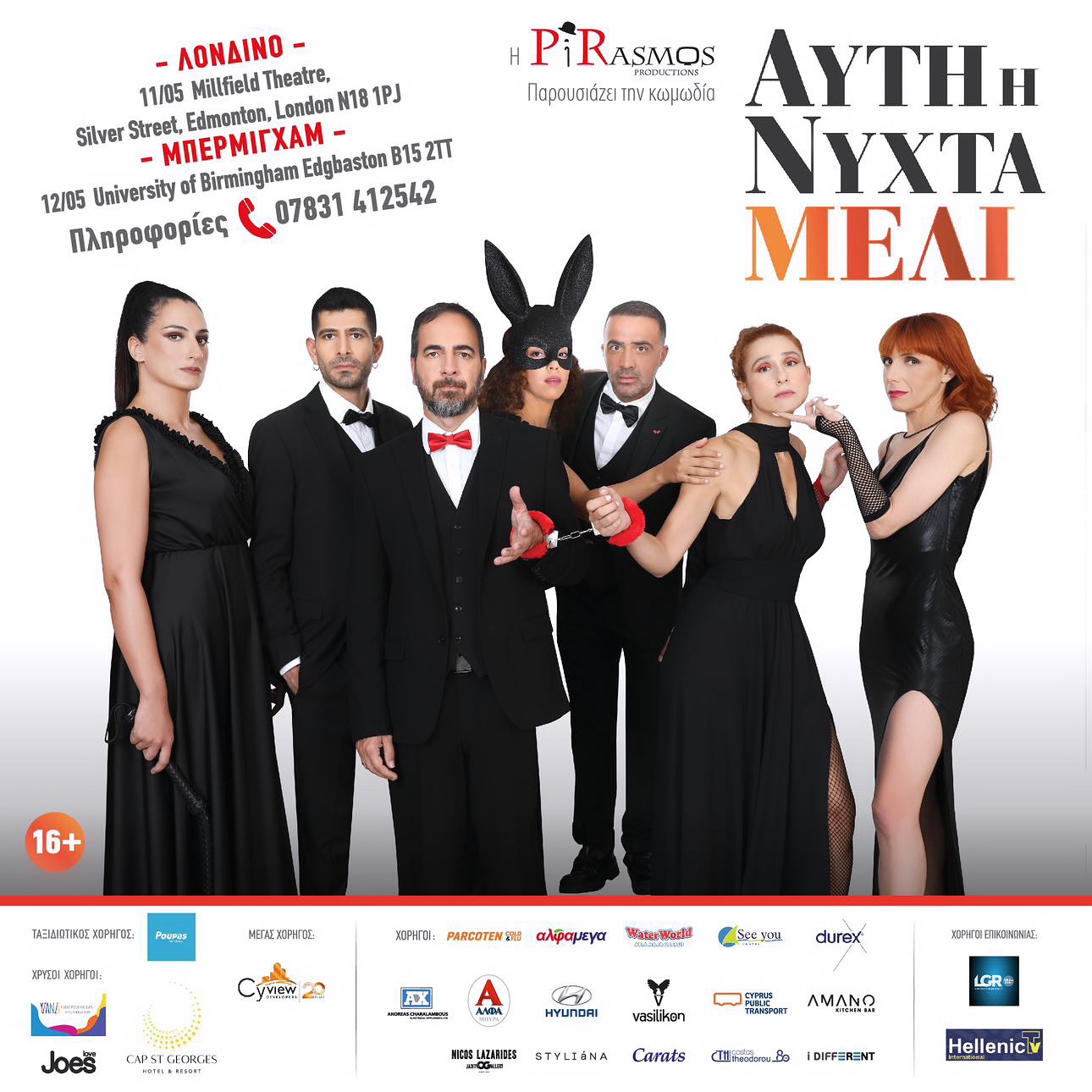
Article written by London Greek Radio

Update: It is with great regret that due to unforeseen circumstances, the LGR Dinner & Dance this Sunday 10th December has been cancelled.
Please note that those who have purchased tickets to contact LGR on 0208 349 6950 for a full refund.
Sorry for any inconvenience caused in this matter.
————————————————————————
LGR are excited to announce that Greek singer Ageliki Darra will be performing live at the Cypriot Community Centre on Sunday 10th December 2023.
Join us for our dinner & dance featuring a live performance by special guest star Ageliki Darra and her musicians. Including singer Giorgos Yerasimos and musicians Panicos Stylianou, Spyros Katsaros and Gabriel Grigore.
Events like this offer the chance for our station to come together with the community and enjoy a fabulous evening. Moreover, through these events, we can renew and build a good relationship with both our listeners and the companies which work alongside us.
In 2023, our time has also been spent putting together events, such as this one, where all members of our community could come and celebrate our culture together.
Join us to celebrate our 34th Birthday broadcasting to you since 1989.
It’s a night not to be missed!
Address: The Cypriot Community Centre, Earlham Grove, London N22 5HJ.
Doors open at 6pm, dinner will be served at 7pm.
Delicious 3 course meal with tea and coffee and live entertainment.
Tickets at £40-£45. For more information & tickets please call LGR on 0208 349 6950!
Tickets are expected to sell fast, so to avoid disappointment, we advise that you secure your place now.
We look forward to seeing you all there.

LGR 103.3 FM Dinner & Dance event
Article written by London Greek Radio

